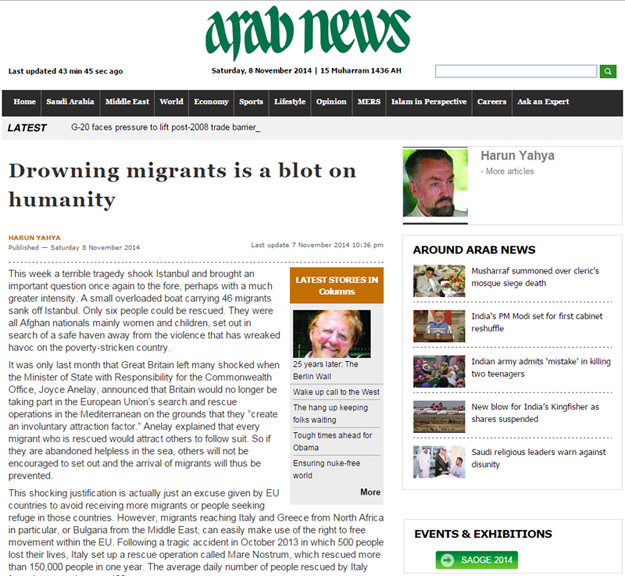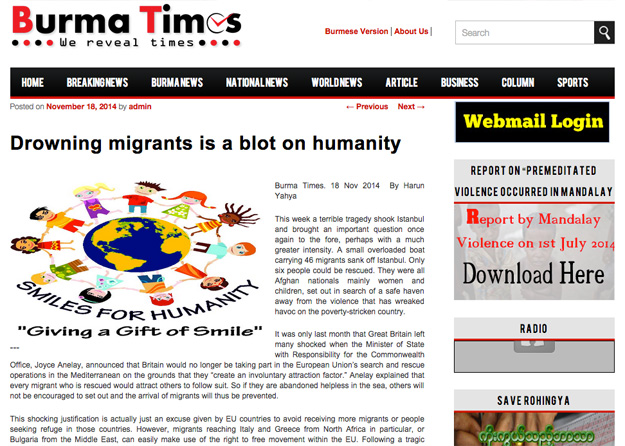
This week a terrible tragedy shook Istanbul and brought an important question once again to the fore, perhaps with a much greater intensity. A small overloaded boat carrying 46 migrants sank off Istanbul. Only six people could be rescued. They were all Afghan nationals mainly women and children, set out in search of a safe haven away from the violence that has wreaked havoc on the poverty-stricken country.
It was only last month that Great Britain left many shocked when the Minister of State with Responsibility for the Commonwealth Office, Joyce Anelay, announced that Britain would no longer be taking part in the European Union’s search and rescue operations in the Mediterranean on the grounds that they “create an involuntary attraction factor.” Anelay explained that every migrant who is rescued would attract others to follow suit. So if they are abandoned helpless in the sea, others will not be encouraged to set out and the arrival of migrants will thus be prevented.
This shocking justification is actually just an excuse given by EU countries to avoid receiving more migrants or people seeking refuge in those countries. However, migrants reaching Italy and Greece from North Africa in particular, or Bulgaria from the Middle East, can easily make use of the right to free movement within the EU. Following a tragic accident in October 2013 in which 500 people lost their lives, Italy set up a rescue operation called Mare Nostrum, which rescued more than 150,000 people in one year. The average daily number of people rescued by Italy from that operation was 400.
Italy, however, citing financial constraints halted the Mare Nostrum rescue operation as of Nov. 1. The new operation to be set up to replace it within the borders of the EU is Triton, with a budget just one-third the size of Mare Nostrum. It would be a mistake to regard Triton as a rescue operation, as it merely provides protection up to 60 miles from the EU coastline, using maritime police. No interest will be taken in migrant boats approaching that border in difficulties.
Commenting on the UK’s decision, the British writer, Robin Lustig, said: “No, we won't help to fund an operation that rescues drowning migrants, because it might encourage others to embark on equally perilous journeys. As in: No, I won’t rescue a child running across a busy road, because it might encourage other children to do the same.” Lustig then goes on to add, “I understand why politicians need to win votes - but by deliberately letting people die? I'm not easily shocked - but I do find that truly shocking.”1
As a matter of fact, there are many other equally shocking measures in place with regard to the migrants. People who rescue those on sinking migrant vessels are regarded as criminals in many EU countries. Italian fishermen who rescued migrants have been put on trial in recent years and their boats confiscated. Those welcoming these people into their homes or renting property to them have also found themselves guilty of offenses.2
No individual with good conscience can obstruct the rescue of a migrant, no matter what the sanctions. One example of the terrible consequence of these measures occurred during the initial days of the Arab Spring. A boat ran out of fuel and drifted for 16 days on the Mediterranean, and although many ships in the region saw it and were aware of the situation, they just looked on. Even NATO helicopters aware of the situation failed to assist. Seventy-two migrants starved to death before the eyes of the world in that incident as the world just sat back and watched.
The weakening of conscience in the EU countries on this issue needs to be especially emphasized. The subject of discussion is not, of course, the fine people of Europe, but a political mentality that regards financial and racial interests as all-important. It is precisely because of such attitudes that national governments become apathetic and soulless capable of abandoning people to die out in the sea.
There is no difference between abandoning someone to drown and willfully stabbing a person. If someone who takes a life is a murderer, then so is a person who abandons another to die. The price of heeding our conscience may sometimes be very high. One may end up being injured in attempting to rescue someone else, or lose out financially or end up facing huge legal difficulties. Yet heeding the conscience means being prepared to risk all that. The peace and joy that comes from doing the right thing cannot be compared to anything else.
Countries have fallen in the grip of a style of politics infused with anger and considerations of realpolitik. Some politicians may have been misled into losing their moral sensibilities. It is easy to devise laws based on calculations of self-interest in air-conditioned rooms with no knowledge of the difficulties being faced by others. It becomes difficult to grasp as to why people flee their countries under extremely difficult conditions. Yet nobody would leave his country packed into a tiny boat, knowingly facing the risk of death, unless he genuinely feared death or faced the threat of war or starvation. They would not sell everything and give the money to some human traffickers. The reason why these people risk their lives to flee is not because of the excellent benefits provided by Great Britain and the EU. These people merely wish to live as human beings, free from dangers.
The real question is: What kind of logic and conscience do people, who abandon others to die in the dark realms of the sea, possess? How could they sleep at night knowing they have been instrumental in another person’s death, in other words they have participated in killing them?
Although they try to ease their consciences by blaming human traffickers, it is unbecoming of EU countries to become part of a tragedy in which more than 3,400 people died just last year. An ethical Europe can only remain ethical if it does not regard those migrants on those boats as African, Middle Eastern, poor or wretched but as “human beings.” Europe can only be regenerated through altruism, not selfishness. Great Britain in particular must immediately withdraw this shocking decision about migrants being abandoned to die. It should not be forgotten that once atrophy of conscience has trickled down from the administration to the people, difficulties, degeneration and tragedies are inevitable. Europe should avoid creation of an infrastructure that will open the door to such disasters.
1. http://www.huffingtonpost.co.uk/robin-lustig/this-immoral-government_b_6080696.html
2. http://www.multeci.net/index.php?option=com_content&view=article&id=216:denizdeki-muelteciler&catid=3:av-taner-klc&Itemid=27&lang=en
Adnan Oktar's piece on Arab News & Burma Times:
http://burmatimes.net/drowning-migrants-is-a-blot-on-humanity/



